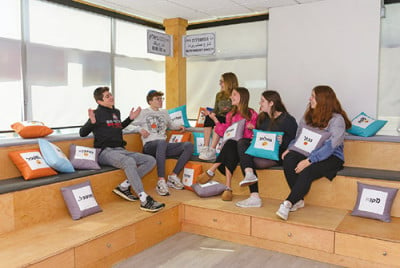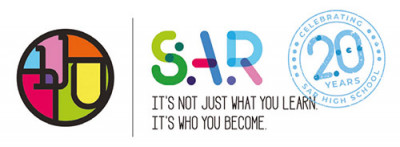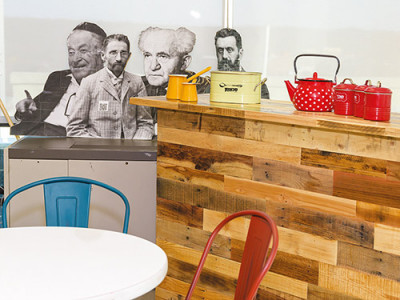
“The Advantage of Hebrew over other languages is that it is the natural garment of Judaism, in which it was born, was raised, and matured.”
-Achad Ha’amThe Hebrew language has played a central role in Jewish identity throughout history. Hebrew instruction took place from generation to generation in the cheider and yeshivot through deep investment, self-sacrifice and, at times, even risk of mortal danger. Learning Torah and Hebrew went hand in hand. In the last century, we witnessed a renaissance and evolution of Hebrew as a modern daily language, and now, as in the past, Hebrew constitutes an important aspect of Jewish identity in Israel and abroad.
SAR High School, in addition to its many strengths in general studies, educates its students to develop a strong Jewish identity, pursuant to the mitzvah of “vehigadeta levinkha, and you shall teach your children” (Shemot 13:8), and, by extension, Hebrew has a central place in the crowded daily schedule. Students at SAR develop, strengthen and nurture their direct connection to Torah learning, Israel and the Jewish people through the Hebrew language.


At the same time, we face the challenges of teaching Hebrew as a second language to students who are exposed to Jewish life and Torah learning on a daily basis while their spoken language is not Hebrew. We aim to create a solid foundation that allows for literacy, navigation of Judaism’s foundational texts and awareness of Israeli current affairs and everyday culture. We teach Hebrew that is deeply rooted in the past, lives in the present and looks towards the future.
“If only we could send our students to live in Israel, even for just a month, to soak up the language and live in it!” This sentence epitomizes our dreams as teachers. Therefore, we occasionally toyed with the idea of setting up a learning center where we could provide our students with a multi-sensory experience that supports Hebrew language instruction that mimics a visit to Israel. We wanted to surround the student with Hebrew from all sides, maximizing their exposure to Hebrew.
Thanks to the Covenant Foundation, Rabbi Tully Harcszark and the faculty of Machon Siach, where SAR’s Innovation Lab resides, we created the “Hebrew Lab.” This is the place where we integrate teaching tools in accordance with the fundamentals of language learning. The learning experience is not one of sitting at a table facing towards a whiteboard but is one of sitting down for a conversation with Shai Agnon in a neighborhood cafe. Students who enter the room find themselves surrounded by visuals of figures and places from Israel that support conversations from our learning.

Our goal for every unit is to address the four skills of language acquisition: reading, writing, listening and speaking. The lab is built in such a way that it allows a teacher to cull the contents of the lesson in the room’s physical corners: One corner is designed as a library which invites students to a pleasant reading experience; The second is a recording studio where students can record video or audio to practice their conversational skills; The third corner is designed as a cafe where students can practice dialogue surrounded by cut-outs of our cultural giants like Ben-Yehuda, Bialik, Rachel and Goldberg; The fourth corner is a stage where students are invited to act out various topics. The entire room looks like we’ve jumped to Israel and surrounds the students with immersive experiences that aid learning.
The lab underscores the importance of exposure to a language as one of the most important factors in its acquisition. We learn this from psychologist Hermann Ebbinghaus, who conducted a series of experiments on himself seeking to identify the factors necessary for retrieval and recall. Ebbinghaus found that, among other tools, experiential learning that stimulates the senses increases recall and the internalization of knowledge. The moment we provide our students with active learning experiences and not just cognitive ones, we allow for a deeper internalization of the material, and we raise the likelihood that the material learned will enter long-term memory. So, for example, when our students are learning a unit on emotions, they find that every corner of the lab speaks to them about the topic. The library corner is filled with pillows with emotions written on them, costumes for improv abound and more.
Beyond experiential learning, the development of proper language for children is achieved by sensory motor stimulation. A baby doesn’t begin speaking immediately after it is born. On its way to language acquisition, it passes through many stages of sensory and motor growth. So too do we, in the lab, initiate language acquisition in as natural and gradual a way as possible. Appealing not only to cognition but to a fuller and more immersive experience leads students to a more complete and successful learning process, allowing students to fully don the garment of our Hebrew language.
Merav Zuriel studied at Yad Ben Zvi Institute and received her M.Ed. in Educational Leadership from the University of Alabama. Ms. Zuriel received her B.A. and B.Ed. from Orot Israel College. She taught literature and history at Yeshiva Elkhanah for more than ten years before joining SAR High School.
Gilad Bargil earned his M.A. in public management and education from Bar Ilan University. Most recently, Gilad served as the head of the pre-Army academy that he established in Lod. He has also lectured about leadership, society, and citizenship.
About Machon Siach: Machon Siach was established in 2015 with a legacy gift from Marcel Lindenbaum z”l, honoring the memory of his wife, Belda Kaufman Lindenbaum z”l.











